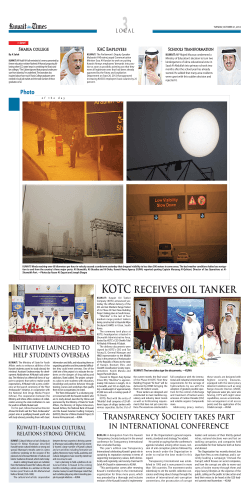
Page 01 - Arab Times
basketball Page 56 THE FIRST ENGLISH LANGUAGE DAILY IN FREE KUWAIT Established in 1977 / www.arabtimesonline.com WEDNESDAY, JANUARY 7, 2015 / RABEE’A AWWAL 16, 1436 AH emergency number 112 NO. 15643 56 PAGES 150 FILS VISA FREEZE ON EBOLA STATES ... INTERIOR QUIZZED ON ‘TRADERS’ MPs bemoan burden on citizens as Oil stands kerosene firm ‘Traffic’ raised Kuwait tightens border security Opinion Abdullah, Salman take united stance By Ahmed Al-Jarallah Editor-in-Chief, the Arab Times The speech given by Crown Prince Salman bin Abdulaziz on behalf of the Custodian of the Two Holy Mosques King Abdullah bin Abdulaziz during the inauguration of the third term of Saudi Shura Council reaffirms the status of the Kingdom of Saudi Arabia as a nation of robust institutions — a nation which follows a clearly defined path and does not change with time or the circumstances but moves along with the modern age. The speech confirms it is not a country of ‘reactions’. It is, as Prince Salman said in the speech, a country based on justice and will remain so. This rhetoric is full of wise and inspirational ideologies for the one who seeks to build a strong nation — a nation which can confront the challenges and contain situations without giving up on its principles. It is more important to note that the speech Continued on Page 12 Email: [email protected] Follow me on: [email protected] By Ahmad Al-Naqeeb and Abubakar A. Ibrahim Arab Times Staff Carrier due KUWAIT CITY, Jan 6 (Agencies): Security authorities of Kuwait have tightened security at the borders following the terrorist attacks carried out by some armed militia at the Saudi-Iraqi borders, reports Al-Qabas daily quoting a security source. He revealed that instructions have been issued to ensure the military intelligence is on alert and working persistently, to dispatch a team from State Security Department to the borders and to strengthen the security surveillance at border areas by assigning increased number of security patrol teams. The source affirmed that the concerned Kuwaiti and Iraqi authorities are on constant communication to control security and confront any terrorist activities. Kuwait meanwhile condemned the terrorist attack that took place in northern Saudi Arabia yesterday, killing three border guards and injuring two others. “This terrorist cowardly attack on the kingdom is considered an aggression on all the GCC countries, Continued on Page 12 Iraqi Prime Minister Haider al-Abadi (second from right), lays a wreath at the Tomb of the Unknown Soldier in central Baghdad on Jan 6, during celebrations marking the Iraqi Army Day. (AFP) Near-term pessimism on Iraq By Cinatra Fernandes Arab Times Staff KUWAIT CITY, Jan 6: Professor Toby Dodge, Kuwait Professor and Director of the London School of Economics Kuwait Programme, delivered a pessimistic near term outlook for Iraq. He warned that if the country does not stabilise, and if regional powers do not rally together to help the Iraqi government, then it may once again become the epicentre of regional instability — a failed state that exports jihadi terrorists, ideological instability, and violence across its borders for generations to come. Dodge speaking on ‘Iraq’s geopolitical risk in regional perspective’ at an exhaustive public lecture hosted by the Kuwait Economic Society, Monday evening, began by sharing Iraq’s long term economic potential before proceeding to elaborate on its long term structural problems, and reflecting upon the drivers of Iraq’s near term and long term future. Even a cursory glance in the contemporary history of the Middle East show that demographics, economics, and religious dynamics have given Iraq a key role in the destabilisation of the region over the previous 40 years. Iraq’s destabilising role began in earnest after the United Kingdom announced its withdrawal from the Gulf in 1968. The removal of this external hegemon coincided with the Dodge seizure of power in Baghdad by the Ba’athist regime first led by Hassan al Bakr and then Saddam Hussein. “It is intriguing that the Ba’athist leadership used the autonomy that oil had given it both domestically and its ability to reject regional power after the nationalisation of Iraq in 1972 to establish its credentials as a regional Continued on Page 6 KUWAIT CITY, Jan 6: Minister of Oil Dr Ali AlOmair insists that the government does not intend to withdraw its decision of lifting the subsidy on diesel and kerosene despite the resultant commotion in the Kuwaiti society. He said the decision was based on a study that was carried out prior to its implementation, whereby it was determined that increasing the prices of diesel and kerosene is a good step as long as companies that directly affect the citizens are excluded from this decision in order to prevent inflation in the market. The minister affirmed that necessary legal measures will be taken against violating companies that increase the prices of their commodities in an unreasonable manner as a reaction to the government’s decision. Meanwhile, the lawmakers are continuing to voice their concerns regarding the matter and urging the government to reconsider its decision if it Continued on Page 12 Ooredoo wins DUBAI, Jan 6, (RTRS): Ooredoo Kuwait has won a court appeal against a 36.69 million dinars ($124.97 million) judgement in favour of the Ministry of Communications, the telecom operator said in a bourse statement on Tuesday. Continued on Page 12
© Copyright 2026











